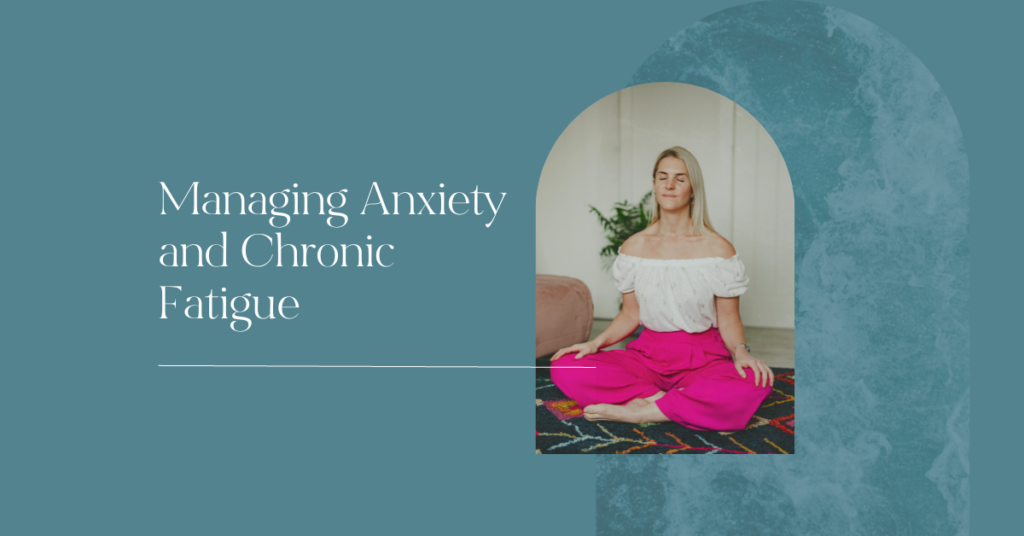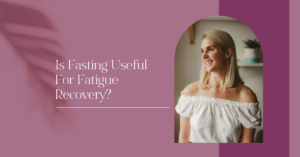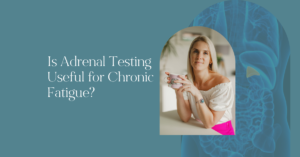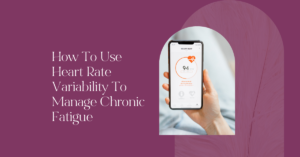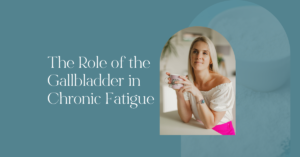Anxiety and mood disorders often go hand in hand with chronic fatigue. It is not uncommon for those experiencing chronic fatigue to also struggle with their mental health. Here we discuss the most important considerations to improve quality of life as you navigate your mood alongside other chronic illness symptoms.
What is Anxiety?
Anxiety is a natural and common human emotion characterised by feelings of unease, worry, or fear. It is a response to stress or a perceived threat, and it can be experienced in various degrees of intensity.
Normal levels of anxiety can be beneficial as they can help you stay alert, focused, and prepared to face challenging or potentially dangerous situations. However, when anxiety becomes excessive or persists even in the absence of an immediate threat, it can become a mental health disorder.
There are several types of anxiety disorders, including:
1. Generalised Anxiety Disorder (GAD)
This involves chronic and excessive worry about various aspects of life, even when there is no apparent reason for concern.
2. Panic Disorder
This is characterised by sudden and intense episodes of fear, often accompanied by physical symptoms like rapid heartbeat, sweating, and shortness of breath.
3. Social Anxiety Disorder
People with this disorder experience intense fear and avoidance of social situations due to a fear of being judged or embarrassed.
4. Specific Phobias
These involve an intense fear of a particular object or situation, such as heights, spiders, or flying.
5.Obsessive-Compulsive Disorder (OCD)
This involves recurrent, intrusive thoughts (obsessions) and repetitive behaviours or mental acts (compulsions) that a person feels driven to perform.
6. Post-Traumatic Stress Disorder (PTSD)
This can develop after a person experiences a traumatic event, and it involves symptoms like flashbacks, nightmares, and severe anxiety.
7. Separation Anxiety Disorder
This is more commonly seen in children, but it can also affect adults. It involves an excessive fear of being separated from attachment figures.
8. Agoraphobia
This is a fear of being in situations where escape might be difficult or help might not be available in case of a panic attack.
It’s important to note that anxiety disorders are medical conditions and not simply a matter of being overly nervous or stressed although being nervous or stressed can increase feelings of anxiety acutely.
An anxiety disorder can significantly impact a person’s daily life, relationships, and overall well-being. If you believe you are struggling with an anxiety disorder, it’s important to seek help from a healthcare professional or mental health specialist. They can provide a proper diagnosis and help develop a treatment plan tailored to your needs.
Anxiety and Chronic Illness
Mood disorders are so much more than just a neurotransmitter imbalance. They can be the byproduct of a complex web of physiological imbalances and psychological strain. For this reason, many people who experience chronic illness, also struggle with their mental health as the same physiological mechanisms (and psychological stressors) that may be contributing to symptoms like fatigue or brain fog, could also be impacting their mood.
The purpose of this blog is to understand these possible mechanisms better and how you could support your body. The information here should not replace medical advice and is best implemented alongside support from an appropriate health care team.
Is the anxiety psychological or physiological or both?
In the case of a physiological mood disorder there may be physiological mechanisms which are contributing to the symptoms. For example:
- Neurochemical imbalances including:
- Neurotransmitter imbalances
- Hormone imbalances
- Thyroid dysfunction
- Blood sugar imbalances (such as hyper– and hypoglycemia)
- Neuroinflammation
- Gut-brain axis disorders
- Brain Injury
- Neurodegenerative disease
- Neurodevelopmental disorders
- Psychological strain
- Neurological autoimmune disease
In the case of a psychological mood disorder there may be psychological stress that is contributing to the mood disorder. If you are experiencing a lot of stress in your life, feeling anxious may be a natural response. Chronic illness specifically is inherently stressful due to the impact it can have on finances, relationships, career, loneliness, sense of identity and purpose in life.
For many people, it is often a combination. When we address physiological mechanisms there can be improved resilience and reduced anxiety and when we address psychological mechanisms (through improving capacity in the nervous system), we also see improved overall resilience and improvements in mood.
The purpose of this blog is to focus on the physiological mechanisms specifically.
How Long Have You Felt This Way?
In anxiety, the ultimate mechanism is activation of the amygdala in the brain, but the goal in practice is to work out why. By identifying the mechanisms that are impacting the anxiety and addressing those mechanisms, we may see an improvement in symptoms and mood.
How long someone has experienced their symptoms, can be a good starting point to identifying the mechanisms involved. For example:
| Recent | Intermittent / Relapsing | Chronic | Lifelong |
| Hormone Imbalance Circadian Rhythm Imbalance Microbiome Imbalance Nutrient imbalance Loss of Stress Adaptation / Chronic Stress Sleep Disorder Sedentary Lifestyle | Neuroinflammation Autoimmunity Thyroid Dysfunction Hormonal Imbalance | Brain Injury Neurodegeneration Undiagnosed Metabolic Condition | Genetic Disorder Neurodevelopmental Disorder Permanent Brain Injury |
The longer someone has experienced a mood disorder, the worse the prognosis. In some cases, for example, lifelong mood disorders, they may not be responsive to interventions but you can improve stress resiliency and support symptoms to enhance quality of life as much as possible.
Management of Anxiety Disorders
Management of Anxiety Disorders starts with supporting the brain and improving stress resiliency by:
- Balancing blood sugar
- Improving sleep quantity and quality
- Creating a movement and/or exercise routine
- Supporting the nervous system and managing stress
- Optimising digestive health and microbiome diversity
Finally, we can add in supplements to support anxiety, but we still want to tend to the underlying physiological mechanisms longer term.
In the rest of this blog, we’ll look at each of these areas in more detail.
Brain Health
An unhealthy brain cannot dampen sympathetic responses. Increased sympathetic tone, increases the production of adrenal hormones, epinephrine and norepinephrine, as well as neuroinflammation.
A brain injury and neurological autoimmunity could be possible things to consider. As are chronic stress, Big Trauma’s, Mould Illness and other infections.
We have written extensively on addressing neuroinflammation and brain health, here is a brief summary of considerations:
- Addressing the underlying immune dysfunction, in the case of autoimmunity, consider using Cyrex Array 5 to test for autoimmune antibodies such as GAD65 which may impact the cerebellum and basal ganglia, two regions of the brain that are involved in dampening sympathetic tone.
- Stabilise Blood Sugar which means addressing both hyper– and hypo-glycemia
- Support blood flow to the brain and rule out anaemia
- Address sleep and circadian rhythms
- When necessary, consider a ketogenic diet removing gluten and dairy if necessary and considering other potential autoimmune triggers
- Exercise and movement within the capacity of the individual
If there are particular activities that exacerbate symptoms, this can give insight as to whether particular regions of the brain may be impacted.
For example, increased anxiety in crowds could signal dysfunction of the vestibular cerebellum. Anxiety with high pitched sounds and bright lights could signal imbalance of the midbrain circuits. Frontal circuits may be influenced by social interactions, critical thinking or executive functions (planning, organising and time management).
Mood disorders that are triggered from these activities can suggest unhealthy mitochondria in the cells of the limbic system. Therefore, we want to reduce inflammation in the brain, but also offer appropriate stimulation to support neuroplasticity and regenerate healthy mitochondria.
Blood Sugar
Stabilising mood requires stabilising blood sugar. When blood sugar drops low, there is a surge in adrenal hormones such as cortisol, epinephrine and norepinephrine. This increases activation of the amygdala.
When blood sugar is too high, this means that glucose isn’t able to get into cells and energise the brain. This can impact overall brain health and mitochondria function i.e. there isn’t energy available for healthy brain function.
Additionally, we need proper insulin signalling to activate the synthesis of neurotransmitters. Surges in insulin associated with poorly balanced blood sugar will negatively impact dopamine, serotonin, GABA and acetylcholine production.
People with high blood sugar may still experience low blood sugar and vice versa, therefore, stability is the goal, but the approach may be different. We have written about addressing both in more detail, but here are some benchmarks to work from.
| Strategies for High Blood Sugar | Strategies for Low Blood Sugar |
| Eat protein, fat and fibre at every meal Limit portion size to prevent energy dips after meals Fast at least 12 hours overnight Avoid fruits and refined sugars Use a ketogenic diet if required Avoid stimulants Manage stress Get adequate sleep | Eat as often as required to prevent energy dips before meals Eat protein, fat and fibre at every meal Eliminate fruits and refined sugars Avoid stimulants Manage stress Get adequate sleep Support the adrenal glands Implement a ketogenic diet if necessary |
Sleep
Sleep is when the brain regenerates, When we don’t sleep, our brains get inflamed, our neurochemistry becomes unstable and we experience heightened sympathetic responses.
It is not just about how much we sleep but meeting the following criteria:
- Sleeping in a rhythm which means going to bed at the same time each day and waking at the same time each day. Which means being able to:
- Fall asleep
- Stay asleep
- Wake feeling rested
When it comes to chronic fatigue, this is easier said than done, which is why I have a blog dedicated to covering this in more detail.
We have also covered the importance of circadian rhythms and establishing a cortisol awakening response here.
Movement
It is not possible to recover from fatigue and mood disorders without a movement or exercise routine. Movement creates extensive biochemical and physiological changes in the body that no drug or supplement can surpass. Movement:
- Supports branching network of neurons
- Helps nerves grow
- Improves neuron synapses
- Makes neuron synapses and communication more efficient
- Reduces risk of neurodegeneration
- Makes more mitochondria which means that your brain has energy for healthy function
- Modulates immune cells and inflammation
- Increases growth hormone
- Increases Nitric Oxide improving blood flow for tissue health and healing
- Increases BDNF for neuro-inflammation and plasticity
- Increases insulin receptor sensitivity
- Increases opioids (natural pain killers)
The downside is that movement or exercise can increase oxidative stress and this can cause post-exertional malaise and energy crashes in people with chronic fatigue.
It is a cruel paradox, but finding a movement routine, however big or small, is essential to creating the changes necessary for long term physical and mental health.
The general guidance is: Do whatever it is that allows you to recover and repeat the same the next day.
This could start with some gentle stretches in bed, to a 5 minute walk around the block, to some gentle qigong or yoga to more intense movement as your capacity builds.
There may be some trial and error in the beginning, so be prepared to make mistakes and learn from them. In some cases, we need to improve the health of the brain and antioxidant systems before movement can progress. Working with a practitioner can be useful when it comes to knowing what to do and when.
We have written more about movement here and here.
Nervous System Support / Stress Management
A big part of supporting stress resiliency is supporting the nervous system. This means having tools which help to increase vagal tone and in doing so, downregulate the sympathetic nervous system. There are many ways we can support the nervous system such as:
- Meditation
- Yoga – specifically restorative and yin yoga
- Breathing exercises
- Cold showers or plunges
- Qigong
- Gargling
- Singing and Chanting
- Mindfulness
As an advanced student of Somatic Experiencing (SE), somatic tools are my favourite and yet, people find healing in many different ways. It goes beyond the scope of this blog to cover this area in detail, but here are some additional resources you may enjoy:
- Podcast: The Nervous System and Chronic Fatigue
- Blog: How To Regulate Your Nervous System in 6 Steps
- Podcast: Somatic Experiencing, Brain Retraining and Healing Updates
- Podcast: Somatic Tools For Chronic Pain
Digestive Health
The gut is often referred to as the second brain and many of our neurotransmitters are manufactured in the gut. Therefore, it goes without saying that poor digestive health may be connected to poor mood.
The gut is another complex area which deserves a blog or several blogs committed to a more thorough discussion.
One of the most important factors to consider where mood is concerned, is ensuring the diversity of bacterial species in the gut which is encouraged by a diet which is diverse in plants.
Something that we encourage our clients to do is a “Microbiome Mash Up”. This is a blend of small amounts (¼ cup) of different vegetables mixed with a little bit of water and taken like medicine each day.
I usually recommend that clients use a food processor to chop up a selection of vegetables (15 to 20 different types) and freeze them in portion sized packets or jars. Each day they can remove their frozen vegetables from the freezer and blend with a little water, possibly even some additional seeds such as chia, flax, hemp or psyllium husk if tolerated.
Here is a video on YouTube which describes the concept.
This can be a lot of work, especially when fatigued, in which case I encourage a diversity of plants throughout the day, 20 different types if possible and at least 30 across the week.
Supplements for Anxiety
When addressing anxiety, we want to address the physiological and psychological mechanisms that are creating the underlying activation of the amygdala. This can take time and sometimes there is the need for some instant relief.
The following are supplements that may be beneficial for anxiety, however, if the underlying mechanisms are not addressed, the efficacy of supplements may reduce and wear off.
- Valerian root
- Passionflower
- L-theanine
- Magnesium
- Fish oils
- Lemon balm
- Kava
- Ginkgo Biloba
- Ashwagandha
- Skullcap
- Chamomile
- Hops
Summary and Conclusions
The key to resolving anxiety disorders is to identify the underlying mechanisms that are involved and supporting those physiological mechanisms with interventions that will have the greatest impact on the most systems (e.g. blood sugar, sleep, movement, digestive health, brain health and nervous system regulation).
In chronic illness and chronic fatigue, anxiety can be due to a combination of psychological and physiological mechanisms and it is important that the individual has the appropriate support for both sides of the coin.
In our practice we offer a combination of Functional Medicine and Somatic Experiencing to create a well rounded support plan for our clients. If this is something that you are interested in, you can find out more about working with us here.

